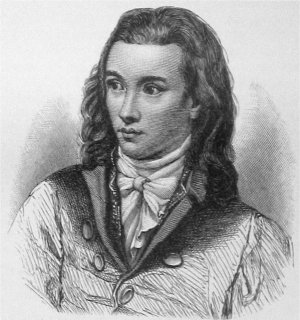Novalis nejznámější citáty
Novalis citáty a výroky

„Zlatý věk je tam, kde jsou děti.“
Varianta: Tam, kde jsou děti, je zlatý věk.
„Náboženství je opium lidstva.“
2. května 1772, zámek Oberwiederstedt – 25. března 1801, Weißenfels. Zdroje: Georg Büchmann - Geflügelte Worte, 6. vyd., Frankfurt 1991 Paul Johnson – Intellectuals, Londýn 1988 (především kapitola o Karlu Marxovi)
Novalis: Citáty anglicky
“Friends, the soil is poor, we must sow seeds in plenty for us to garner even modest harvests.”
Motto
Blüthenstaub (1798)
Fichte Studies § 556
“Everywhere we seek the Absolute, and always we find only things.”
Fragment No. 1; Variant: We seek the absolute everywhere and only ever find things.
Blüthenstaub (1798)
Ralph Waldo Emerson in "Goethe; or, the Writer" writes of this passage, and quotes a slightly different translation: The ardent and holy Novalis characterized the book as "thoroughly modern and prosaic; the romantic is completely levelled in it; so is the poetry of nature; the wonderful. The book treats only of the ordinary affairs of men: it is a poeticized civic and domestic story. The wonderful in it is expressly treated as fiction and enthusiastic dreaming:" — and yet, what is also characteristic, Novalis soon returned to this book, and it remained his favorite reading to the end of his life.
Novalis (1829)
“Pure mathematics is religion.”
Reine Mathematik ist Religion.
Blüthenstaub (1798), Unsequenced
Novalis here alludes to Plutarch's account of the shrine of the goddess Minerva, identified with Isis, at Sais, which he reports had the inscription "I am all that hath been, and is, and shall be; and my veil no mortal has hitherto raised."
Pupils at Sais (1799)
“The highest life is mathematics.”
Das höchste Leben ist Mathematik.
Blüthenstaub (1798), Unsequenced
Fragment No. 24 Variant translation: The first step is to look within, the discriminating contemplation of the self. He who remains at this point only half develops. The second step must be a telling look without, independent, sustained contemplation of the external world.
Blüthenstaub (1798)
“We are on a mission: we are called to the cultivation of the earth.”
Fragment No. 32; Variant translations: We are on a mission.We are called to form the earth.
We are on a mission.We are called to educate the earth.
Blüthenstaub (1798)
“Man is a sun and his senses are the planets.”
Blüthenstaub (1798), Unsequenced
Varianta: Man is a sun and his senses are the planets.
Pupils at Sais (1799)
“Every beloved object is the center point of a paradise.”
Fragment No. 51; Jeder geliebte Gegenstand ist der Mittelpunkt eines Paradieses.
Variant translations:
Every beloved object is the centre of a Paradise.
As quoted by Thomas Carlyle in "Novalis" (1829)
Every beloved object is the midpoint to paradise.
Blüthenstaub (1798)
“Where children are, there is a golden age.”
Fragment No. 97
Blüthenstaub (1798)
“The poem of the understanding is philosophy.”
“Logological Fragments,” Philosophical Writings, M. Stolijar, trans. (Albany: 1997) #24
Pupils at Sais (1799)
“Fate and temperament are the names of a concept.”
As quoted in Demian (1972) by Hermann Hesse, trans. W.J. Strachan
Wahrhafte Anarchie ist das Zeugungselement der Religion. Aus der Vernichtung alles Positiven hebt sie ihr glorreiches Haupt als neue Weltstifterin empor...
English translation as quoted in The Dublin Review Vol. III (July-October 1837); The original German is quoted http://www.jlrweb.com/whiterose/leaffourger.html from the Fourth Leaflet http://www.jlrweb.com/whiterose/leaffoureng.html of the White Rose (1942)
Variant translation: True anarchy is the generative element of religion. Out of the annihilation of every positive element she lifts her gloriously radiant countenance as the founder of a new world.
“Philosophy … bears witness to the deepest love of reflection, to absolute delight in wisdom.”
“Logological Fragments,” Philosophical Writings, M. Stolijar, trans. (Albany: 1997) #12

